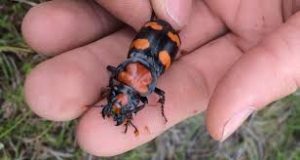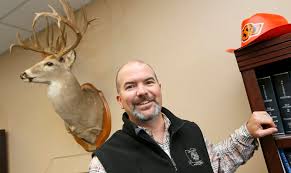
The decision by the U.S. Fish and Wildlife Service to downlist the American burying beetle under the Endangered Species Act drew support this week from U.S. Sen. Jim Inhofe, the Oklahoma National Guard, U.S. Rep. Markwayne Mullin, the Petroleum Alliance of Oklahoma and others.
The government downlisted the beetle from endangered to threatened.
“Downlisting the American burying beetle from endangered to threatened is the right call and the first step to total delisting,” said Inhofe. “Since it was listed over 30 years ago, the population of the ABB has made a resurgence – dramatically expanding the areas that are forced to deal with cost and red tape to work around its habitat.”
He says the action provides important regulatory relief to farmers, ranchers, home builders, developers and the energy industry, adding they all were plagued by what he said was the “unnecessary endangered listing” of the species.

Congressman Markwayne Mullin used the announcement to deride the Endangered Species Act, saying it “has not fulfilled its mission and instead created burdensome red tape and unnecessary obstacles for landowners, small businesses and communities to comply with.”
“I applaud the Trump Administration for finalizing the rule to downlist the American burying beetle and give regulatory certainty to landowners,” said Rep. Mullin in a statement.
Bud Ground, Director of Regulatory Affairs for the Petroleum Alliance of Oklahoma also supported the downlisting. So did Lieutenant Colonel terry C. Hale Jr., the Environmental Branch Chief of the Oklahoma National Guard. He said the final rule will be “very helpful in allowing us to continue with our mission while still supporting natural resources.”

J.D. Strong, Director of the Oklahoma Department of Wildlife Conservation called the move a testament to conservation success.
“While we look forward to the day when the beetle is delisted completely, I appreciate our partners at the U.S. Fish and Wildlife Service for taking the bold step of downlisting the species to threatened status, making it easier for Oklahoma’s producers to contribute to our national food and energy security while still providing continued conservation of beetle habitat.”
When originally listed in 1989, the American burying beetle was known to exist in only two locations: Oklahoma and Rhode Island. Since 2005, there have been confirmed populations in eight states including Arkansas, Kansas, Nebraska, Oklahoma, South Dakota, Rhode Island, Massachusetts and Missouri. In addition, up until 2008, surveys confirmed beetles in Texas.
The Fish and Wildlife Service stated it will continue to monitor the species and its habitat across federal, tribal, state and private lands.
Source: Sen. Inhofe announcement





